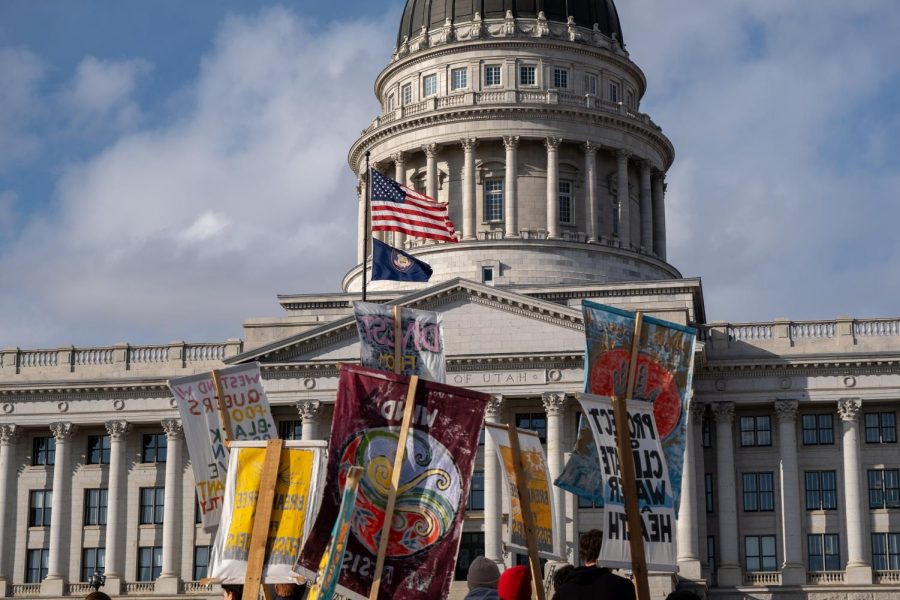Fridays for Future Utah Hosts 2023 Global Climate Strike on the Steps of the Utah State Capitol
Global climate strike protestors march towards the Utah State Capitol in Salt Lake City on Friday, March 3, 2023. (Photo by Marco Lozzi | The Daily Utah Chronicle)
March 4, 2023
On the last day of the 2023 Utah Legislative Session, around 50 Salt Lake City community members joined the fight of 7,500 cities across the globe with their own strike, advocating to end fossil finance and protest inaction on climate change. They first gathered at Washington Square Park, marching to the JP Morgan Bank, and finally reaching the Utah State Capitol Building, where speakers gave their remarks.
Before the event, Elena Rügemer, an organizer for Fridays for Future Utah, told the Chronicle an emphasis for this year’s strike is the shrinking of the Great Salt Lake.
“We’re striking to let our voices be heard,” she said. “We’re fighting for our future.”
Rügemer started organizing with Fridays for Future Utah after noticing a lack of turnout at the global climate strike in September 2022.
“So when I realized that only so little people showed up, I thought I really needed to take action and join in and hopefully spread the word and really let our voices be heard by many people,” she said.
She spoke about the importance of protecting the environment for future generations, calling the toxic dust storms coming off the exposed lakebed of the Great Salt Lake “terrifying.”
“I think about my kids, I think about other people’s kids, and I want them to have a normal life,” she said. “I want them to be able to just live without having all these issues that we have now.”
On the Steps of the Capitol
Alex Veilleux from Save our Great Salt Lake kicked the speeches off, unraveling a banner with a “Great Salt Lake To-Do List” painted on it. Some items included “Water to the Lake Now,” “Conservation First” and “Landback.”
“This session, they talked a lot of game, you may have heard them saying that they’re taking this issue seriously, but they had many, many opportunities to capitalize on actual action that could have helped the Great Salt Lake and most importantly, gotten water to the lake now, and they just chose not to,” Veilleux said.
This session, legislators chose not to set a target level elevation for the lake, saying it would “put a stake in the sand.” Others cited the good snowpack this year as the reason for holding back on “emergency water-saving measures.”
However, the good snowpack is not enough to raise the lake’s levels to where they need to be.
“Are we gonna let them get away with saying that we’re just having a good snow year so we’re not going to do anything?” Veilleux said.
The crowd responded with a resounding “No.”
Veilleux continued on to speak about the lack of tribal leaders in decision-making bodies created for the lake.
“Tribes are the best ecological stewards as they’ve been stewarding this Great Basin since time immemorial,” Veilleux said. “Now is the time to integrate tribal co-management and co-stewardship of Great Salt Lake into all decision-making bodies.”
Rae Duckworth, the leader of Black Lives Matter Utah, took the mic next, telling the audience, “Make some noise if you understand how Black liberation correlates with our climate.”
Duckworth said it is important to stand with BIPOC individuals in this fight because “this fight is not new to them.” Duckworth asked the audience, “If your activism does not have intersectionality, what is your activism?”
“Being intersectional is understanding every part of the intersection with climate,” Duckworth said. “So how we’re talking about amplifying the West Side? Yes, we should be. But in order to do that, we do have to press our freaking government.”
Brandi O’Brien, from Utah Physicians for Healthy Environment, started her speech by saying, “We have a saying at UPHE — ask your doctor if clean air is right for you. If he says no, you need a new one. Well, that stands for the legislature as well. The science is clear that there is no safe level of air pollution.”
Deeda Seed, the next speaker, is a mom, activist and organizer for the past 40 years and also campaigns with the Center for Biological Diversity. Looking at the audience full of young folk, she thanked them.
“As a mom, I’m so grateful for you showing up today and for the work that you’re doing,” she said.
London Kelley, a sophomore at the University of Utah and part of Clean the Darn Air, told the audience about being born and raised in Utah and witnessing firsthand the effects of climate change on family members.
“My grandpa has a collapsed lung,” Kelley said. “During the winter, he can’t go outside.”
Collin Williams spoke to the audience about having meaningful, compassionate conversations with one another about change.
“I’m going to ask you to be compassionately curious with the people you’re talking to,” Williams said. “We’re gonna be talking to a lot of people that are very wrong, but they’re gonna need a space to be wrong so that they can eventually be right.”
Nan Seymour, a lake-facing poet and advocate for the Great Salt Lake, expressed the importance of standing up for something when life is at stake.
To the legislators, she said “We are losing the lake on your watch, because you are not watching closely enough and meanwhile, we the people are paying fierce attention and we will keep vigil, we will walk the receding shoreline, we will count the corpses of birds.”
Bridget Raymundo, another U student, said society has lost touch with planet Earth.
“We need to change and we need support from our world leaders and from industry,” Raymundo said. “Yes, money talks, but we should be listening to our youth activists.”
Katie Balakir with Save Our Canyons talked about the Utah Department of Public Transportation’s proposed gondola in Little Cottonwood Canyon.
“And while you might be asking, ‘What the heck does a gondola have to do with saving our lake?’” Balakir said. “Well, the gondola is yet another manifestation of the same problem: greed and profit at the expense of our natural spaces.”
The speeches concluded with Vaughn Lovejoy, who told the audience to go out into nature.
“Put away your bikes, your climbing gear and go with humility and offer your life in service to the Earth and listen,” Lovejoy said.
After the event, Raquel Juarez, an organizer with Fridays for Future, told the Chronicle that events like this are about finding community.
“To know that they’re not alone with these issues and to keep spreading the word about the climate crisis, because there’s a lot of things that are important to do, such as talking to our legislators, lobbying,” she said. “The only thing that will make that stronger and more effective is if there’s more pressure from society as a whole.”
Today’s event, she said, was about building up that pressure.









